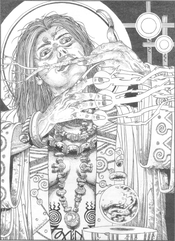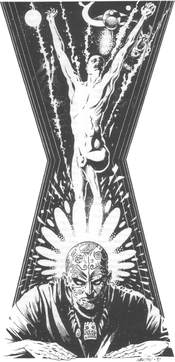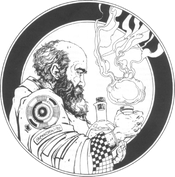Magic Primer
Traditions
There are many magical traditions, but the three most common in Seattle are hermetic mages, shamans, and physical adepts.
- Hermetic mages use a formal tradition viewing magic as the wielding of abstract forces through a logic of complex symbols and formulae of power.
- Shamans receive their power through linking their own inner world of emotion, will, and faith with the external world of nature, represented by a particular animal totem.
- Physical adepts direct their awakening inwards, focusing on enhancing their own abilities.
These traditions base their practices and learning out of magic lodges: hermetic libraries, medicine lodges, and training sanctuaries.
While most improvement in the abilities of a magic user come through learning new spells or adept abilities, powerful metamagic abilities can be learned through initiation, which may involve undergoing an ordeal or accepting a geas.
Spellcasting and Adept Abilities
Sorcery (used by hermetic mages and shamans) and kinetics (used by physical adepts) involve manifesting well-defined effects in the world. Using them can inflict mana drain. Their use leaves astral signatures. Sorcery requires line-of-sight to operate, while adept abilities only affect the self.
Sorcery can be channeled through a ritual allowing group casting and effects that work outside of line-of-sight. Rituals require a magic circle to perform. Adepts cannot lead ritual sorcery, but trained initiates may support it.
Astral Space
Astral space is a parallel dimension that coexists with the physical world. It is both the source of magical energy and the medium through which it travels.
Astral space can be assensed using astral perception and explored separately from the body using astral projection. Astral space contains a reflection of physical entities and astrally-present astral entities. The reflection of most physical objects is insubstantial, but living things (including the Earth) block astral travel.
The nearby etheric plane is only the most easily-accessible portion of the metaplanes, with the further planes only available to those with advanced training.
Astral space can be polluted by a background count, impacting the use of astral perception, astral navigation, and other magic abilities.
While activity in astral space can't normally influence the physical plane, active magic can provide a pathway using grounding.
Spirits and Conjuring
Spirits are beings of astral energy that appear within astral space, many of which can manifest on the physical plane. Most that people will interact with are summoned, but others include free spirits that decided to stay on Earth, infestations of insect spirits, invading horrors, and the pseudo-spirit watchers.
Conjuring is the art of summoning, commanding, contesting, and banishing spirits. Hermetic mages invest time and resources into conjuring elementals, embodying the four elements of earth, wind, air, and fire. Shamans can quickly conjure nature spirits that are specific to the domain they current occupy. Conjuring leaves an astral signature allowing magic users to be identified based on the traces they leave behind.
Enchanting and Foci
Enchanting describes the entire process of studying, understanding, producing, repairing, and otherwise working with the physical materials used in the practice of magic. These include the fetishes that shamans might use to focus their sorcery, the various components of ritual magic, and foci.
Foci can be used to assist the practice of magic.
- Spell foci enhance the casting of a specific spell or type of spell.
- Spirit foci aid conjuring.
- Power foci help magicians channel magical energy beyond what they could normally handle.
- Spell locks allow a spell to be sustained on a target without the attention of the caster.
- Weapon foci are enchanted weapons.
Unique artifacts that provide abilities not normally possible in the Sixth World are rumored and much hyped by popular media, but are generally dismissed as urban legends by experts.


